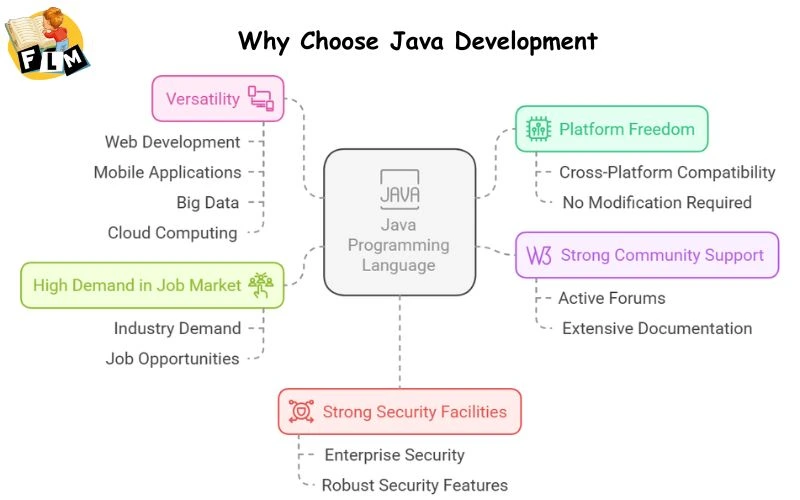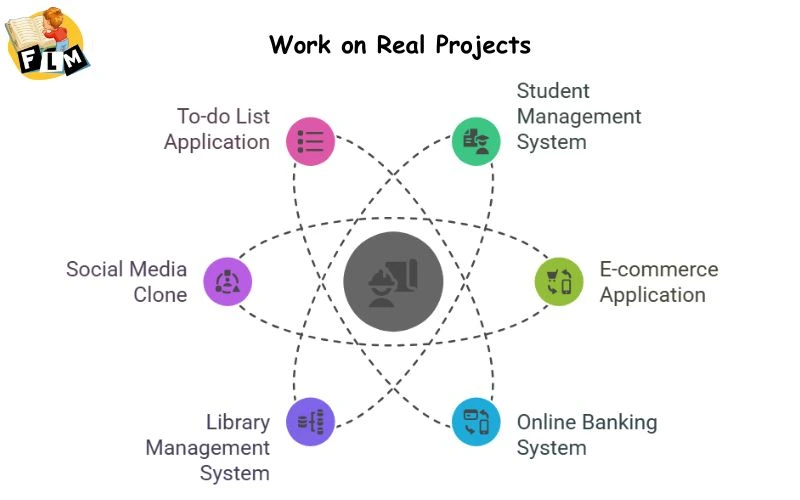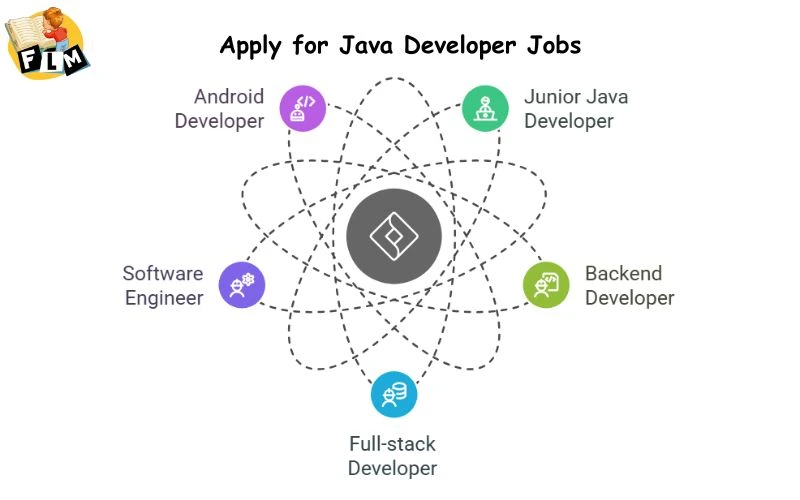Java is one of the most popular programming languages in the world. It is used to make web applications, enterprise solutions, mobile applications and many others. Known for its versatility, platform independence and strong community support, Java has become a top option for developers and businesses.
If you are ready to become a Java developer, this guide will take you through the steps required to start and pursue it in this career. Until the experience gains on hand from mastery in basic things, this blog will answer the major question: How to become Java Developers?
What is Java?
Java is a high-level, object-oriented programming language that follows “Write once, run anywhere” (WORA) theory. It runs on any device with its Java Virtual Machine (JVM), which ensures the platform independence. Java is widely used for web development, mobile application, desktop software and enterprise solutions. Its security, scalability and rich libraries make it a top option for businesses around the world. Java Power Banking System, e-commerce platform, cloud app, and more. With strong community support and continuous updates, a valuable skill remains for Java developers.
History of Java
Java was developed in 1995 by James Gosling at Sun Microsystems. Since its release, it has developed in one of the most widely used programming languages. Java applied during Finance, Healthcare, e-commerce and enterprise solutions. Its platform freedom, safety and scalability contribute to its popularity. With continuous updates and a strong developer community, Java remains a top option worldwide.
Why Choose Java Development?

Java has been a major programming language for decades. Here is a great option for developers:
- Platform Freedom: Java runs on many platforms without modification.
- Strong Community Support: Java has a huge community of developers worldwide in Java.
- High Demand in the Job Market: Java developers are highly demanded in various industries.
- Versatility: Java is used in web development, mobile application (Android), Big Data and Cloud Computing.
- Strong Security Facilities: Java has underlying security facilities, which make it suitable for enterprise applications.
Step-by-Step Guide to Becoming a Java Developer
Learn the Basics of Programming
Before diving in Java, it is important to understand the fundamental programming concepts such as:
Variable and Data Types
- Operators
- Control Details (Loops and Conditions)
- Functions and Methods
- Object-Oriented Programming (OOP) Theory
If you are a beginner, you can start with basic programming languages like python or C to understand the key principles. Understanding these basic things is necessary to answer the question: How to become a Java developer?
Understand Core Java
Once you have a basic understanding of programming, start learning the core Java. Some major topics include:
- Object-oriented Programming (OOP): Class, objects, inheritance, polymorphism, encapsulation and abstract.
- Java Syntax and Basics: Data Type, Loop, Conditional Statement.
- Exception Handling: Try-Catch block, Custom Exception.
- Collection structure: list, sets, maps and queues.
- Multithreading and Concurrent: Thread Life Cycle, Synchronization.
Practice Coding Regularly
To master Java, practice is necessary. Platforms like:
Offer Java challenges that improve your problem solving skills. Practicing regularly helps to write efficient, customized and clean code. Regular coding practice plays an important role in answering How to become a Java Developer?
Learn Java Development Tools
A Java developer should be skilled in using various tools, such as:
- IDE (Integrated Development Environment): Eclipse, IntelliJ Idea, or NetBeans.
- Build Tools: Maven and Gradle for Management of Dependence and Building Projects.
- Version Control System: Git and GitHub for code cooperation and version tracking.
- Unit Testing Framework: Junit and Testing for testing Java applications.
Mastery in these devices will make you more efficient in writing, testing and deploying Java applications.
Explore Java Frameworks
Java Framework simplifies the development process. Some popular framework includes:
- Spring Boot: For the building of enterprise applications.
- Hibernate: For database connectivity using ORM (Object-Religious Mapping).
- Straits: For web application development.
- Java Server FACES (JSF): User is used for the building of user interfaces for Java applications.
Understanding these frameworks will help you build scalable and maintainable applications.
Learn Database Management
Java applications often interact with the database. Learn:
- SQL: MySQL, PostgreSQL, or Oracle Database.
- NoSQL: MongoDB or Cassandra.
- JDBC (Java Database Connectivity): Connecting Java applications to the database.
It is necessary to have strong database management skills for backend development.
Work on Real Projects

The Building of real -world projects enhances your skills and adds value to your resume. Some initial-friendly projects include:
- Student management system
- E-commerce application
- Online banking system
- Library management system
- Social media clone
- To-do list application
You can demonstrate these projects on GitHub to attract potential employers.
Learn About Java Web Development
To become a full-stack Java developer, learn:
- Servlets and JSP (Java Server Page)
- Spring Boot for the REST APIs
- Frontend Technologies (HTML, CSS, JavaScript, Angular, React)
- Thymeleaf for template rendering
Web development skills will help you create interactive and responsible web applications.
Understand Deployment and Cloud Computing
Modern Java applications are deployed in the cloud environment. Know about:
- Dokar: Containerizing Java Application.
- Kubernetes: Orchestration for Java Microservices.
- AWS/Azure/GCP: Cloud Services for Java applications.
- CI/CD pipelines: Using Jenkins, GitHub Activities and GitLab CI/CD for automation.
Cloud computing knowledge is necessary in today’s development scenario.
Explore Advanced Java Concepts
Once you mastered the basics, look like Advanced Java subjects:
- Microservices Architecture: Spring Boot and Spring Cloud.
- Reactive Programming: Project Reactor and RxJava.
- Performance adaptation: JVM tuning, cashing mechanism.
- Safety Best Practice: Secure Coding Practices, Authentication and Authority Mechanisms.
Build a Strong Portfolio
A well -structured portfolio enhances the possibility of your job landing. Should join your portfolio:
- Individual Projects and Open-Source Contribution
- Code samples on GitHub
- Certificate in Java (Oracle Certified Java Programmer, Spring Framework Certification, etc.)
A strong portfolio refers to your expertise and dedication to Java development.
Apply for Java Developer Jobs

Once you build your skills and portfolio, start applying for Java Developer Roles. Some job roles include:
- Junior java developer
- Backend developer
- Full-stack developer
- Software Engineer
- Android Developer (Java-based application)
Use platforms such as LinkedIn, really and Glassdoor to find job opportunities.
Conclusion
Becoming a Java Developer is an exciting journey that requires dedication, practice and continuous learning. By following this step-by-step guide, you can create a strong foundation in Java, master the necessary equipment, and gain experience on your hands through projects. Whether you are making a beginning or looking to pursue your career, staying updated with industry trends and improving your coding skills will help you succeed.
If you are wondering How to become a Java Developer, then learn the basics, work on real -world applications and explore frameworks such as spring. Understanding How to become a Java Developer is updated with the latest progression and actively participating in coding communities. With persistence and perfect approach, you will achieve your goal of becoming a skilled Java Professional.
Suggest Articles:
-
What’s Next After Completing Your Java Full Stack Course
-
The Importance of User Experience in Java Applications
-
Local Resources for Java Developers in Telangana
Future-Proof Your Career with FLM’s AI-Powered Java Full Stack Development!
Java Full Stack Developer Training
Learn Java, Spring Boot, React.js, SQL, and AI automation to build powerful web applications. AI is transforming software development, and companies need skilled Java full stack developers who can integrate AI-driven solutions. This 5+ month live, interactive training will help you master real-world projects, automation tools, and industry best practices.
What You’ll Gain?
- High Demand – AI Skills Give You a Competitive Edge
- Earn ₹12 LPA+ with Java Full Stack & AI Expertise
- 100% Live, Expert-Led Training
- AI-Powered Development – Automate Coding & Debugging
- 7 Major & 7 Mini Real-World Projects for Hands-On Experience
- Mock Interviews, Resume Building & Career Guidance
- Exclusive: 2-Year Recording Access for the First 100 Enrollees
- Job-Ready Curriculum with Real-World Applications
Unlock your future with FLM’s AI-Powered Java Full Stack Development
Limited Seats Only– Enroll Now!
Visit: frontlinesedutech.com | Click Here to Enroll
WhatsApp: 8333077727

